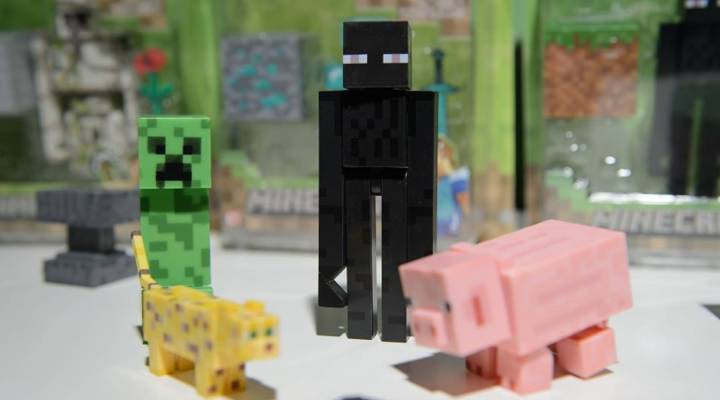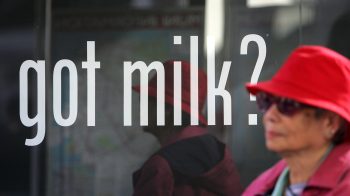
Minecraft has real-world life lessons to teach us
If you’re looking for pointers on how to survive the zombie apocalypse (because you never know, it could happen) look no further than the works of Max Brooks, author of the epic horror novel “World War Z.” Brooks has made a specialty of looking at things differently. That skill is put to use again in his latest book about another kind of survival adventure in the online gaming world of Mojang’s “Minecraft.” Brook’s first-person novel — sort of a digital “Robinson Crusoe” — is called “Minecraft: The Island.” Marketplace host Kai Ryssdal called him up to talk about it. The following is an edited transcript of their conversation.
Kai Ryssdal: We should say right at the outset you are a “Minecraft” aficionado.
Max Brooks: Aficionado is a wonderful word. We used to just call them nerds.
Ryssdal: OK. Pick your own. But you play the game.
Brooks: Very much so, whenever I get some free time.
Ryssdal: Why then write a book about it? Was it something that was calling you, or did Mojang, the company, call you?
Brooks: No, a little bit of both. When I started playing the game, it was through my son, and as I started playing it with him, I realized, as a player, it’s amazing, but also as a parent, every single challenge in the game, on a survival level, essentially teaches you life. Patience, planning, you name it, “Minecraft” has it. And so eventually when Mojang asked if I had a take on Minecraft, I said, “Oh, yeah. Oh, I’m ready to write this book.”
Ryssdal: Well, and it plays into, broadly speaking, the theme of your writings, which is survival and getting by.
Brooks: Oh, yeah. I mean, this is the exact same theme of every single book I’ve ever written, which is characters thrown into adversity, which they did not ask for but must adapt to in order to survive.
Ryssdal: There’s another theme that runs through your work, other than being prepared, and that is, I guess, fear, right? It wouldn’t be too much actually to say sheer terror if you get the World War Z, but fear and uncertainty and anxiety.
Brooks: Yeah. And my parents, who are no stranger to fear and anxiety tell me from a very early age to —
Ryssdal: We should say here who your parents are, Mel Brooks and Anne Bancroft, right?
Brooks: Mel Brooks and Anne Bancroft, or as I like to call them, my father, the combat veteran of World War II, who spent his formative years defusing mines and booby traps. And my mother, the closet scientist whose favorite book was “Microbe Hunters.” They both taught me the best way to deal with fear is to confront it and study it, because what’s so terrifying about fear is the unknown. And once the unknown becomes known, then you really can fight it and conquer it.
Ryssdal: Just to make a turn here off what you said about your dad and him being a World War II veteran and having that combat experience, you too, although not a veteran, have ties and interest in military affairs.
Brooks: Yeah, a little bit. My initial experience was in ROTC in college, in which my main memories are simply running track and then dry vomiting every morning. But now I’m on a think tank at West Point called the Modern War Institute. And part of my job is to study military issues embedded in nonmilitary stories like Monsanto, or logistics in disaster preparedness, or Venezuela.
Ryssdal: Tell me about the Monsanto thing, because that’s actually fascinating.
Brooks: Well, ironically, it all started from an NPR story, probably was Marketplace, where it was the initial Supreme Court case of Monsanto turning seeds into intellectual property. The idea that for the first time in history, America is vulnerable to food blackmail. Because now that Monsanto has a legal claim to 80 percent of our corn and 90 percent of our soybeans, they have sold themselves to Bayer, which is a German company, which we have a security treaty with, which is great. But there’s nothing in the bill of sale to stop Bayer from selling it to China. And there is nothing to stop China from using food the way OPEC used oil in the 1970s.
| Microsoft thinks Minecraft can help STEM education |
| Who owns the seeds bought by farmers and gardeners? |
Ryssdal: Can we talk for a minute, actually, about how you approach that kind of analysis? Because not everybody looks at that Monsanto thing and says 14 layers down, well this could be a strategic threat if x, y, z happens. When you approach it, how do you do it?
Brooks: Dyslexia. I can tell you that growing up dyslexic prevented me from the standard method of learning in our school system, which is memorization and regurgitation. I simply couldn’t cram the facts into my head for a week and then vomit them out on a standardized test. I had to understand every minute detail of what I was learning. And then once it stays in my brain, I’m able to connect those facts with new facts that are coming in. So when I first heard about Monsanto, I realized, “Wow, this is potentially OPEC. This is the oil embargoes of my childhood of the 1970s.” So that’s why I’m able to connect it.
Ryssdal: I don’t want to keep on playing themes to your work here, but it seems to me that there’s another one that’s fairly constant, and that is change, both in “Minecraft The Island,” certainly in “World War Z” and lots of other stuff that you’ve done and talked about. I would appreciate your sense of change as we sit now in this political and economic environment in this country, when all of us are deeply, deeply stressed on many levels about probably a bunch of different things, depending on who you are.
Brooks: Yeah, I honestly think that the last election was a referendum on change, where you had one candidate who said, “Listen, the world has changed, and a lot of you have been left behind. And you have to reinvent yourselves. And it’s going to be hard. And it’s going to take patience.” Then the other candidate said, “Listen, I’ll give you a time machine where I’m going to take you back before the change, when you felt strong and young and powerful and relevant.” And that message sold. In order for us to survive this change, which used to happen every 20 years, and now it’s happening, seems like every 20 minutes. You wake up one morning, and you need a whole new skill set. And that’s what I was trying to get through in “Minecraft: The Island.” I mean, literally, when I was writing “Minecraft: The Island,” they changed the game. And I woke up one morning, I sat down at the game and suddenly all the rules were different. It was a new version. That’s an amazing life lesson. And I put it in the book. Sometimes the world changes, and you’ve just got to change with it.
There’s a lot happening in the world. Through it all, Marketplace is here for you.
You rely on Marketplace to break down the world’s events and tell you how it affects you in a fact-based, approachable way. We rely on your financial support to keep making that possible.
Your donation today powers the independent journalism that you rely on. For just $5/month, you can help sustain Marketplace so we can keep reporting on the things that matter to you.


















